Smartphones & Tablets | September 8, 2023
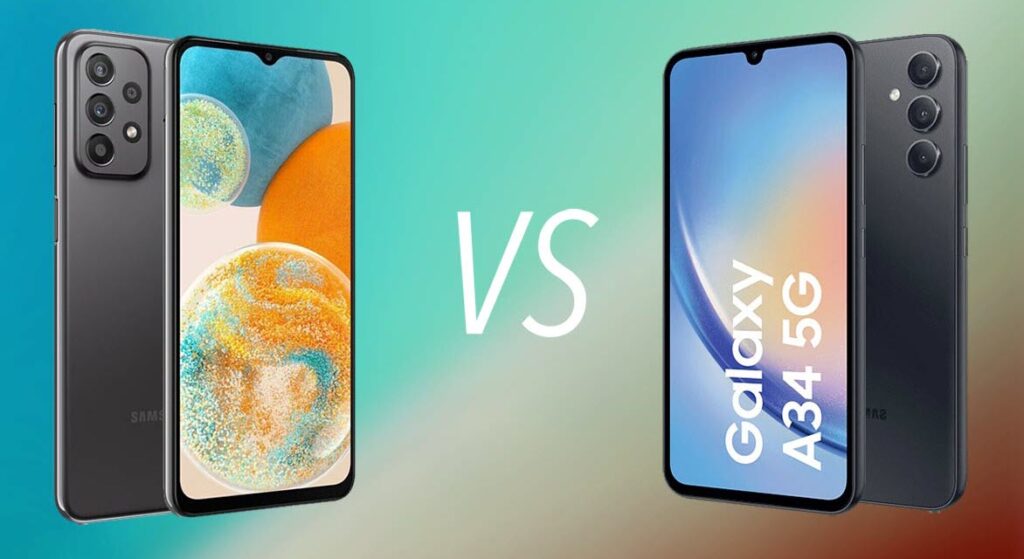
| Samsung Galaxy A23 5G | Samsung Galaxy A34 5G | |
| Screen | 6.6 inches with TFT LCD technology, Corning Gorilla Glass 5 protection, 20:9 format, Full HD+ resolution and 120 Hz refresh rate | 6.6 inches with Super AMOLED technology, Corning Gorilla Glass 5 protection, 20: 9 format, Full HD + resolution and 120 Hz refresh rate |
| Main chamber | – 50-megapixel main sensor and f/1.8 focal aperture with optical stabilization – Secondary sensor with 5-megapixel wide-angle lens and f/2.2 focal aperture – Tertiary sensor with 2-megapixel macro lens and f/2.4 focal aperture – Quaternary sensor of depth of 2 megapixels and focal aperture f / 2.4 | – 48-megapixel main sensor and f/1.8 focal aperture with optical stabilization – Secondary sensor with 8-megapixel wide-angle lens and f/2.2 focal aperture – Tertiary sensor with 5-megapixel macro lens and f/2.4 focal aperture |
| Camera passes selfies | 8-megapixel main sensor with f/2.2 focal aperture | 13-megapixel main sensor with f/2.2 focal aperture |
| Internal memory | 64 and 128 GB type UFS 2.2? | 128 and 256 GB type UFS 2.2? |
| Extension | Via micro SD cards up to 1 TB | Via micro SD cards up to 1 TB |
| Processor and RAM | Qualcomm Snapdragon 695 4GB RAM | MediaTek Dimensity 1080 6 or 8 GB of RAM |
| Battery | 5,000 mAh with 25 W fast charge | 5,000 mAh with 25 W fast charge |
| OS | Android 12 under Samsung One UI 4.1 | Android 13 under Samsung One UI 5.1 |
| Connections | 4G LTE, 5G SA and NSA, WiFi 802.11 a/b/g/n/ac dual-band, Bluetooth 5.1, GPS + GLONASS, NFC and USB Type-C | 4G LTE, 5G SA and NSA, WiFi 802.11 a/b/g/n/ac dual-band, Bluetooth 5.3, GPS + GLONASS, NFC and USB Type-C |
| SIM | Dual nano SIM | Dual nano SIM |
| Design | Polycarbonate finish Colors: black, white, blue and flesh-colored | Polycarbonate finish Colors: black, white, blue and flesh-colored IP67 certification with protection against water and dust |
| Dimensions | 165.4 x 76.9 x 8.4 millimeters and 197 grams | 161.3 x 78.1 x 8.2 millimeters and 199 grams |
| Featured Features | Fingerprint sensor on the side, NFC for mobile payments, 25 W fast charging, facial unlocking via software… | Fingerprint sensor under the screen, NFC for mobile payments, 25 W fast charging, facial unlocking via software, IP67 dust and water protection… |
| Release date | Available | Available |
| Price | from 300 euro | from 400 euro |
The brand new Samsung Galaxy A series has landed in our country with a new wave of mid-range smartphones; we’re talking about the Samsung Galaxy A34 5G, which competes directly with the Galaxy A23 launched in 2022. As its name suggests, the Galaxy A23 5G positions itself as the more affordable device between the two. In terms of specifications, both devices share a solid common foundation, but they differ in aspects such as their displays, camera systems, batteries, and other features, making it a choice between one model or the other. To evaluate which model is worth buying in 2023, we have prepared a detailed comparison to analyze all the differences between the Samsung Galaxy A23 vs A34.
The prices mentioned in the article could change over time, we limit ourselves to analyzing the differences as of the publication date. Additionally, specifications could vary depending on the market.
Not only do they belong to different ranges, but both have been released in the market with a year’s difference. But what are the differences between the Samsung A34 vs A23? That’s what we’ll analyze throughout this article.
The company has embraced a similar aesthetic to adorn both jewels of the mid-range, dressing them with a polycarbonate back cover. The only visual difference is found in the way the camera module is presented, with a slight protrusion in the Galaxy A23. On the other hand, the Samsung A34 integrates the sensors directly into the chassis, with an appearance similar to that of the Galaxy S23.
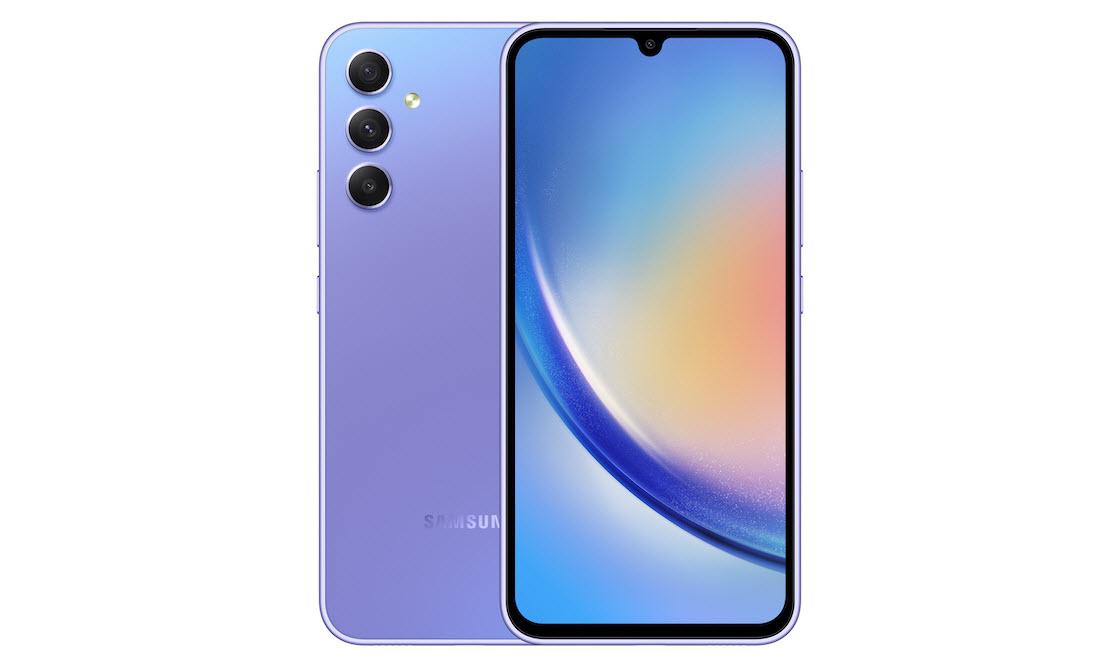
Where we don’t find as many differences between the Samsung A34 vs A23 is in the dimensions department. Both boast a 6.6-inch display, so the measurements are very similar to each other. The budget model is taller by about 0.4 millimeters, precisely due to having less utilized bezels. It’s also slightly thicker, but nothing significant.
Regarding water and dust resistance, the A34 5G holds the coveted IP67 certification, which provides protection against liquid incursions, even underwater. The rest of the differences can be summarized in the absence of a 3.5mm headphone jack in the latter. On the other hand, the Galaxy A23 integrates a physical fingerprint sensor attached to its power button, while its higher-cost counterpart features an under-display fingerprint recognition sensor, as a result of the implemented technology.
Samsung has opted for radically different panels in the Galaxy A23 5G and the A34 5G. The former boasts a TFT panel with Full HD+ resolution and a 120Hz refresh rate, while the latter features a Super AMOLED panel with identical resolution and the same refresh rate. Besides conventional specifications like maximum brightness, contrast ratio, or color calibration – aspects manufacturers usually hide – OLED panels outperform LCDs in multiple ways.
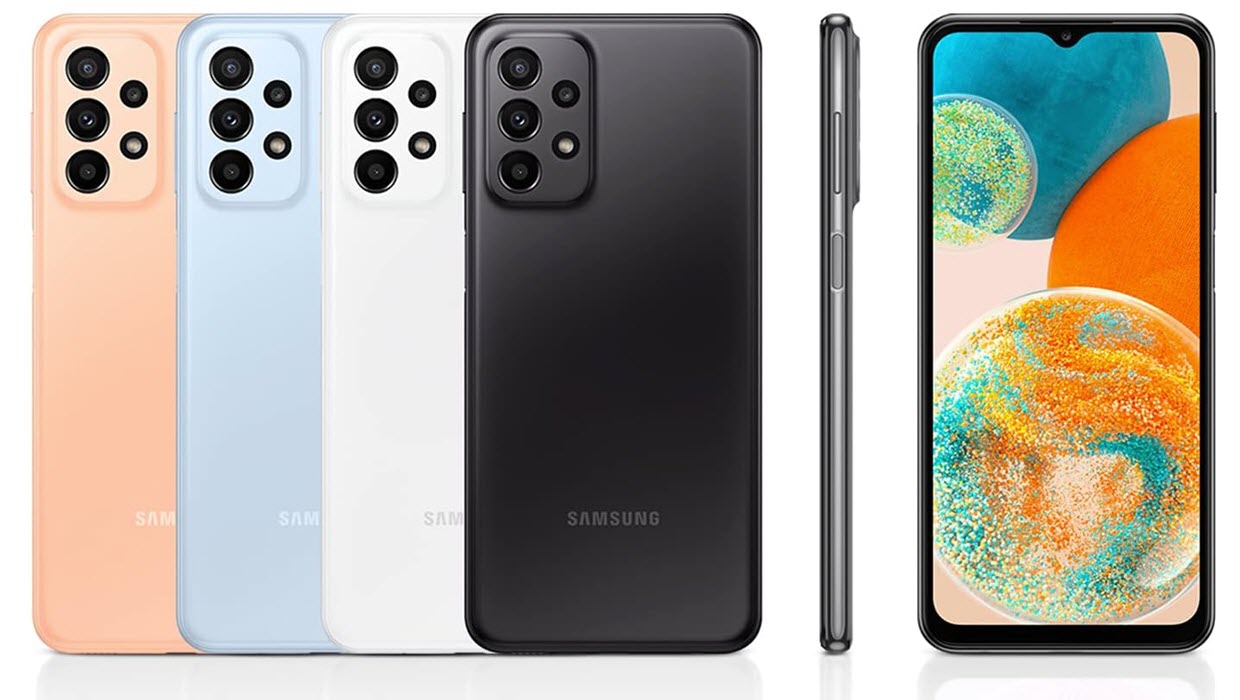
Generally, these types of displays offer substantially superior contrast ratios, as they can represent blacks with purity by turning off pixels. Colors also display more vividness and intensity, which means a broader color gamut. Additionally, energy efficiency is another argument in favor of OLED panels.
That’s right. The Samsung A23 5G opts for a Qualcomm processor, the Snapdragon 695 5G, while the Samsung A34 5G goes for the famous MediaTek Dimensity 1080. The latter theoretically provides about 21% more performance according to various tests conducted on Antutu. However, it’s undeniable that processors manufactured by Qualcomm offer broader compatibility with community-made modifications, such as GCam or the installation of unofficial ROMs.
Regarding the rest of the specifications, RAM is available in a single 4GB version for the cheaper model. The Samsung Galaxy A34 is offered in 6GB and 8GB versions, with more generous storage options of 128GB and 256GB compared to the 64GB and 128GB of the Samsung A23. Luckily, both are compatible with micro SD card installation.
And what about connectivity? The range of connections is replicated in both cases, except for the Bluetooth version, which is newer in the Galaxy A34 (Bluetooth 5.3). The system version also differs between models due to the release date gap between them. On one hand, the Samsung A23 was launched with a software version based on Android 12 under One UI 4, compared to the thirteenth iteration of the system and One UI 5.1.
In the photography department, we find a similar setup in the Galaxy A23 vs Galaxy A34, with differences in resolution and the number of cameras. Although the former belongs to a lower range, it inherits several specifications from the A34 5G. Essentially, both share an identical lens configuration, encompassing a main camera, a wide-angle lens, and a macro lens. However, the more budget-friendly model adds an additional sensor, which is intended for Portrait mode. Furthermore, the main sensor of both devices is accompanied by an optical stabilization system, which translates to improvements in both video recording and night photography.
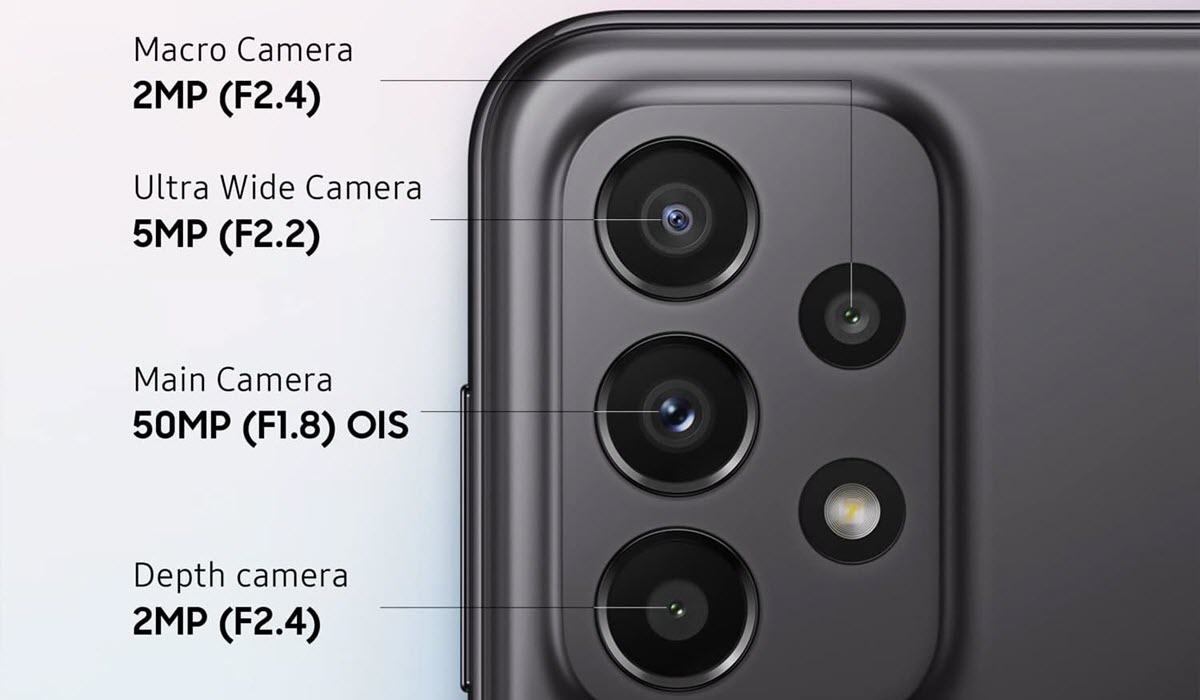
In terms of technical specifications, the first boasts four sensors of 50, 5, 2, and 2 megapixels, while the A34 5G opts for three other sensors with capacities of 48, 8, and 5 megapixels. It’s clear that further testing is necessary to reach a definitive conclusion, although everything points to the newer model taking the trophy due to the sensor size and the resolution of the complementary sensors.
This same scenario is also reflected in the front camera, where the sensors boast 8 and 13 megapixels, respectively, and are accompanied by additional features for facial recognition.
At least on paper, as both devices feature a 5,000mAh battery, as well as a 25W fast charging system. It’s important to note that neither of the two comes with a charger in the box, so you would need to purchase one separately.
Regarding the energy efficiency of components like the processor or the display, there could be fluctuations in the final autonomy of either model, depending on the usage scenario. However, the differences should be insignificant.
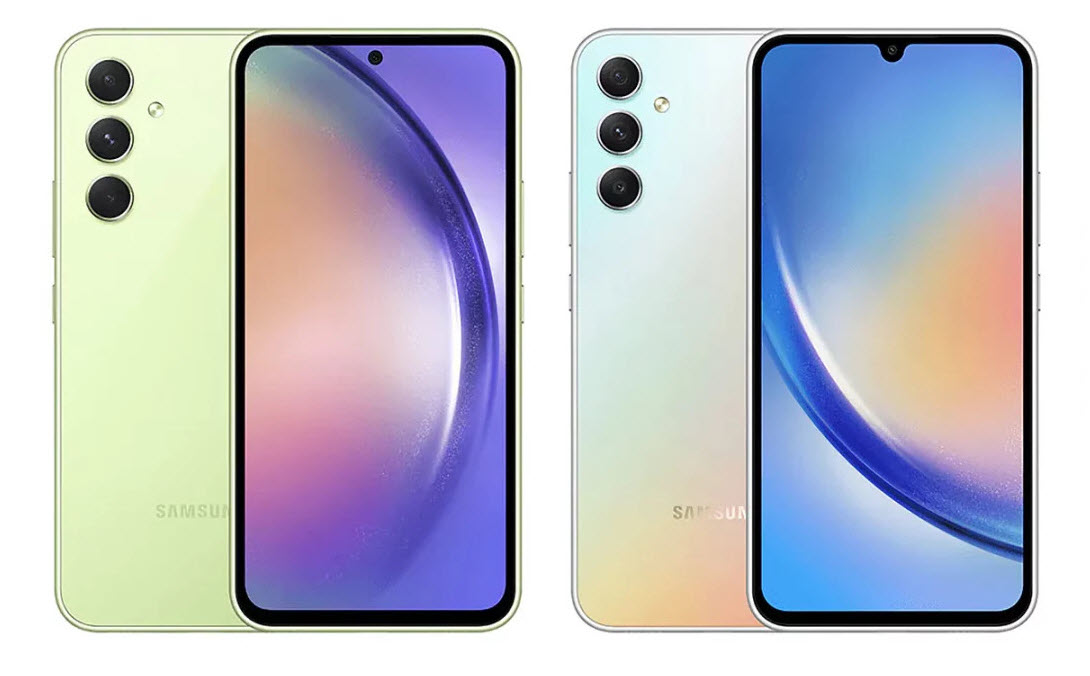
After taking a look at all the differences between the Galaxy A23 vs A34, it’s time to draw some conclusions. To do this, we will consider the current prices of both phones, as at the time of this publication, the A23 5G is cheaper than the A34 5G, as expected. How much do they cost? Around 235 and 277 euros on Amazon. With this in mind, the question is: which of the two is worth buying?
Clearly, the Galaxy A34 5G is the more recommended option of the two due to features like water and dust protection, the AMOLED display, and its larger size. It also offers more power, a more competent camera setup, and a more updated Android version. Due to the minimal price difference, it’s always best to opt for the newer model.